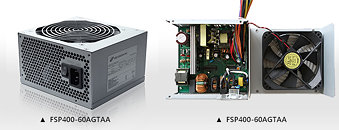Wednesday, December 24th 2014
FSP Announces 80 PLUS Titanium Power Supplies
Having committed themselves to 'green image' in switch mode power supplies (SMPS) for two decades, FSP Group's corporate social responsibility (CSR) activities reflect in their dedicated policies toward safety, quality and environment. By innovation in improving the performance of SMPS, they put the Group's CSR into action in energy saving and carbon footprint reducing product design. Among 80 PLUS certified power supply list, FSP Group's brands headed the list with more than 390 models. Now they proudly announce to be the first power supply manufactory to launch the latest 400W SMPS with the most efficient specification--80 PLUS Titanium PSU.
Keeping the CSR in mind, FSP's R&D teams work tirelessly in increasing product efficiency. Development of what was to become the MIA ICTM(Multiple-Intelligence Ability) began in 2008, when FSP Group started to research active clamp forward topology. MIA ICTM, FSP Group's own design patent, later became the core technology in Aurum series, which were recognized as high cost-performance ratio products by their customers.On top of this, we are also working on reducing heat generation that caused by energy conversion lost. The directions were taken towards circuit layout design, components placement and Copper Bus Bar usage. Effectively placing heating components is vital to create negative air pressure; while extensively using Copper Bus Bar to conduct a substantial current of electricity is beneficial for energy-efficiency considerations. Together these three elements laid the foundations of a new era: Taking efficiency to the next level, FSP Group are thrilled to launch a brand new 400W PSU model with 80 PLUS Titanium logo.
Making SMPS as small footprint as 400W with up to 94.18% of the energy conversion efficiency not only significantly reduces energy wastage, but also makes it applicable to computers and office equipment which means energy saving was not just a slogan but a way of life. FSP Group have built a strong reputation for supplying high quality, most reliable SMPS and will add a significant value proposition going forward.
Keeping the CSR in mind, FSP's R&D teams work tirelessly in increasing product efficiency. Development of what was to become the MIA ICTM(Multiple-Intelligence Ability) began in 2008, when FSP Group started to research active clamp forward topology. MIA ICTM, FSP Group's own design patent, later became the core technology in Aurum series, which were recognized as high cost-performance ratio products by their customers.On top of this, we are also working on reducing heat generation that caused by energy conversion lost. The directions were taken towards circuit layout design, components placement and Copper Bus Bar usage. Effectively placing heating components is vital to create negative air pressure; while extensively using Copper Bus Bar to conduct a substantial current of electricity is beneficial for energy-efficiency considerations. Together these three elements laid the foundations of a new era: Taking efficiency to the next level, FSP Group are thrilled to launch a brand new 400W PSU model with 80 PLUS Titanium logo.
Making SMPS as small footprint as 400W with up to 94.18% of the energy conversion efficiency not only significantly reduces energy wastage, but also makes it applicable to computers and office equipment which means energy saving was not just a slogan but a way of life. FSP Group have built a strong reputation for supplying high quality, most reliable SMPS and will add a significant value proposition going forward.

24 Comments on FSP Announces 80 PLUS Titanium Power Supplies
i.e. increased price of electricity make the key requiring high efficiency power supplies. like
this one has been released and sold well in JP weehttp://www.plugloadsolutions.com/psu_reports/CFD%20SALES%20INC._KRPW-TI500W%2094+_500W_ECOS%203999.1_Report.pdf
20% load (80W) - 94% efficiency
Pretty cool for many green systems like AM1 platform.
A technically educated consumer doesn't get duped by ad hype.
en.wikipedia.org/wiki/80_Plus
and why dont we just go beyond 80+? why not a 90+ Silver or whatever PSU?
Read the info. at the link.
en.wikipedia.org/wiki/80_Plus
I'd like to see a 250w titanium Flext-ATX though.
If system runs at 250W usage most of the time, 500W unit would make the most sense. Anything less or more would result in lower operational efficiency. If system is fully loaded most of the time, at 500W, it's best to buy a 1000W PSU.
But to say if you need 500W and buy a 1KW... that is just wasting your money.
en.wikipedia.org/wiki/80_Plus
There is about a 3% loss in efficiency at 20% use and 100% use compared to 50% use for Bronze, Silver, Gold, Platinum and Titanium PSUs. Let's say your system needs 500 watts and you leave it on 24/7/365 and you run it full bore 4 hours a day. Then what is it costing you? That depends on what you pay per kWh.
The national average here in the USA is 12 cents per kWh
20 hours a day at idle ~ 100 watts * 365 days a year * 3% inefficiency / 1000 watts * 12 cents per kWh = $2.63 per year
4 hours a day at full power ~ 500 watts * 365 days a year * 3% inefficiency / 1000 watts * 12 cents per kWh = $ 2.63 per year
So about $5.25 a year.
It just doesn't amount to much unless you're paying a lot more than 12 cents per kWh or you're running your rig at max all the time.